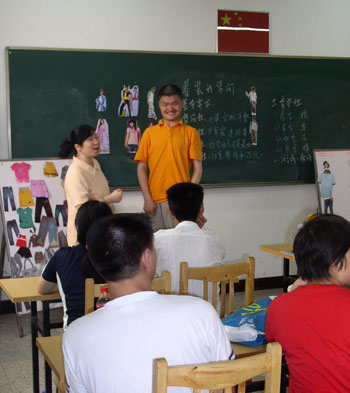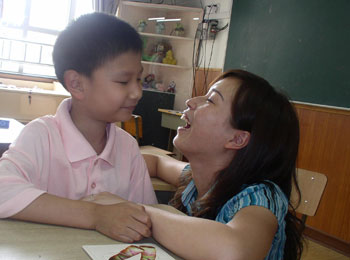| Home / China / Features | Tools: Save | Print | E-mail | Most Read |
| From Cash to Caring |
| Adjust font size: |
Known as China's city of money, Shanghai is soon to find new fame as the country's capital of caring. With its high-rise skyline, the modern center of business, a meeting place for trade between East and West, is often seen as soulless and ruled by the renminbi. But with the coming of the Special Olympics in October, the city will show the world a different face. Initiated by Eunice Kennedy Shriver in 1968, the Special Olympics has become a global movement to empower individuals with intellectual disabilities to become physically fit, productive and respected members of society through sports training and competition. In a nod to the fast development of the Special Olympics, China became the first country in Asia to host the Games when Shanghai won the bid to host the 2007 Special Olympics Summer World Games in 2002. Three months away from the opening of the Special Olympics in Shanghai, which falls on October 2, the festive atmosphere can be felt everywhere in the city. Special Olympics advertisements are shown all day on huge plasma screens along the bustling streets in the heart of the city, and a series of activities celebrating the 100-day countdown to the event were held in June. A 6.5-km fun run celebrating the countdown attracted some 20,000 Shanghai citizens despite sweltering temperatures, which topped 34 degrees Celsius. Among the participants were babies snuggling in their parents' arms and senior citizens over 70 years old, as well as mentally handicapped runners. Leading the run were Wang Junxia, a former Olympic gold medallist, and Zhao Zengzeng, an athlete representative for the Special Olympics. At a ceremony to unveil a 100-day clock for the 2007 Special Olympics, Shanghai Party head Xi Jinping, and Special Olympics athletes 18-year-old Qiao Meili and 11-year-old Yan Chenglin, pressed a button to lift the curtain on the clock. "We are not building new venues, and we're not making a profit from the Games. Our goal is to get more people involved to create a civilized and harmonious environment for mentally handicapped people," Han Zheng, Mayor of Shanghai, said at a ceremony to mark the 100-day countdown. Details of the event's organization demonstrate an unsung spirit in Shanghai-community spirit. During the pre-game host town program, a traditional four-day non-sport program that foreruns the Special Olympics, residents from more than half of Shanghai's city blocks and suburban areas will provide accommodation for athletes and coaches, as well as organizing entertainment and sports events. Local families will also accommodate some foreign athletes during the Games themselves. Education Incorporating the nine-year schooling of primary school and junior middle school, Nanyang School for the Mentally Handicapped in Shanghai's Jing'an District enjoys an almost peerless teacher-student ratio among all schools in the district. There are 29 teachers and only 53 students. The facilities are excellent: Every student that is able to use a personal computer has his or her own one. Each student enjoys tailor-made courses designed to suit their particular interests and temperament. For example, a child who is very color-sensitive will attend more drawing classes than other children.
Nineteen-year-old Li Dongming, who has a below average IQ, enjoys being the model for his teacher, who hands out clothes coordination advise at Sunshine Home, a government-sponsored rehabilitation center for mentally handicapped people in Shanghai. Wang Zejun, 10, has studied at grade one of the school for three years. Wang has a small figure for a child of his age. He cannot speak, shows almost no expression and cannot play any game more complicated than lifting glass balls from one box to another. His teacher Xue Huiqing keeps an eye on her student and on her watch, as every one to two hours the boy has to be accompanied to the toilet. The special education school, like many others in Shanghai, is financed by the city government and dedicated to providing free nine-year compulsory schooling to children with serious mental handicaps. Teachers in Nanyang School are also responsible for offering home schooling to children with mental disabilities in Jing'an District who are unable to receive normal schooling. Despite the slow progress made by Wang, whose intelligence quotient cannot even be measured, most of his schoolmates are making remarkable progress. When Xu Buqing first came to the class, the eight-year-old autistic student spent all day musing in his own world. Now he has learned to put together jigsaws and recite ancient poems under the instruction of his teacher Chen Qi. Whenever the boy wants to go outdoors to play, he begs his teacher's accompaniment by pulling her hands. According to Chen, who graduated from the School of Preschool Education and Special Education of East China Normal University, this act of trust is quite remarkable for an autistic patient. "His first act of intimacy with me has given me a sense of satisfaction beyond words," said Chen. According to the headmaster of the school Shi Feng, last year the school sent three students who achieved outstanding levels of mental development to regular schools, which she said is the best way for mentally handicapped people to be absorbed by society. However, for 15-year-old Li Chuanyang, it was a slightly different story. She studied in a regular primary school and was switched to Nanyang School two months after going to a regular middle school. "She has normal social communication skills but a relatively low intelligence quotient, which leads to her poor academic performance," said Shi. Li said her classmates laughed at her underperformance and depression made her moody and introverted. Now at Nanyang School, Li has become a star student and has developed particular interest in cooking and computer classes. She has joined the school's baseball team and has competed as part of it all over Shanghai. "I have become more brave and healthier due to the exercise of playing baseball," said Li. Teachers at the school have started to teach her courses at regular middle schools to prepare her for entrance exams for vocational colleges after graduation. Teachers and pupils at Nanyang School will be paying special attention to the Special Olympics in Shanghai. The national team for the event will be mainly comprised of students and graduates of the school. Sunshine Two years after Shanghai won in its bid to host the 2007 Special Olympics, the Shanghai Disable Persons' Federation conducted a survey on living conditions for mentally disabled people aged from 16 to 35. The survey concluded that these young people were often indulged in self-isolation and the quality of life of their families was poor.
Chen Qi, a teacher at Nanyang School for the Mentally Handicapped in Shanghai, gets great satisfaction from every word uttered by her autistic student Xu Buqing. Cao Ziping, Party head of the Shanghai Disable Persons' Federation, explained that this age group of people mostly graduated from nine-year intelligence nurturing schools but could not find any job opportunities. He said most of them were shut off from society and their intelligence levels dropped sharply as a result of lack of communication, while in many cases melancholy or even despair tortured their families. In some families, at least one parent, usually in the prime of their career, had to quit their job to take care of the child. Out of Shanghai's 170,000 mentally handicapped population, over 10,000 were in such conditions, he said. These 10,000 families were saved from despair when in 2005 the Shanghai Municipal Government started the Sunshine Home program, which intends to build a community rehabilitation center for mentally disabled people in every city block and suburb of Shanghai. In these Sunshine Homes, mentally disabled people can receive lessons on basic life skills, like reading signs and cooking simple dishes, receive Olympics-type sports training, do simple work which they are paid for and receive other rehabilitation exercises. So far, a total of 240 Sunshine Homes have been set up in Shanghai, which have altogether 11,500 registered members. Nineteen-year-old Li Dongming, who has never attended a school or rehabilitation center before, is a happy member of Songnan Sunshine Home. As an only child, Li was a little spoiled by his grandparents, who insisted on him being home schooled out of the worry that their grandson might be bullied by other children at a mentally handicapped school. When Li's mother heard about Sunshine Homes and suggested sending her son for classes two months ago, her parents-in-law raised immediate opposition. However, Li's changes completely dismissed the worries of his grandparents as the boy has become a different person. Li, who was too shy to have dinner with a guest to his family, now often raises his hands to answer questions in the Sunshine Home's classes, answering using body language as he is mute. "The teachers here are so kind and responsible," said Li's mother, 47, accompanying her son to a basketball session at the Sunshine Home. While Li practiced shooting a basket with his classmates, who cheered his every success, she said her son's life has been broadened since before his only entertainment was playing computer games and watching television. He has been trained at the Sunshine Home to make work permit cards, she added. Although teachers said Li's progress is slow due to difficulty concentrating, his mother has great hope for his future at the center. "Learning a craft and supporting himself," said Li's mother, "I really cannot think of any better life for him." (Beijing Review July 30, 2007) |
| Tools: Save | Print | E-mail | Most Read |
 |
| Related Stories |

